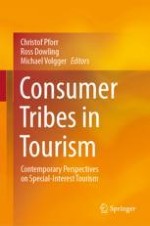2021 | OriginalPaper | Chapter
2. Special Interest Travel: Reflections, Rejections and Reassertions
Authors : Betty Weiler, Tracey Firth
Published in: Consumer Tribes in Tourism
Publisher: Springer Singapore
Activate our intelligent search to find suitable subject content or patents.
Select sections of text to find matching patents with Artificial Intelligence. powered by
Select sections of text to find additional relevant content using AI-assisted search. powered by
